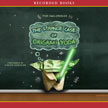 Recently, one of the narrators for the very fun book by Tom Angleberger, The Strange Case of the Origami Yoda, agreed to share some secrets about the recording of the audiobook.
Recently, one of the narrators for the very fun book by Tom Angleberger, The Strange Case of the Origami Yoda, agreed to share some secrets about the recording of the audiobook.
Read on to see how Mark Turetsky became a narrator, and why he had to re-record some sections because his Yoda impression was “too good”!

1. How did you become an audiobook narrator?
I’m a trained actor through NYU’s drama program at Tisch School of the Arts. But I’m also something of an English lit nerd. In my senior year of college, I figured out that I had done enough English Lit classes to earn an English minor, so I guess that audiobooks was a perfect fit, even though I didn’t know it at the time.
I started working in voice overs in 2005, and got a day job that happened to be in the same building as Recorded Books’ studios in New York City, and asked Claudia Howard, the producer there, to listen to a narration I’d done for a holocaust museum up in Maine. A few months later, she invited me in to audition for an audiobook about Houdini. About six months after that, she called me up and offered me the part of Jake in Wendy Mass’ Every Soul A Star, which became my first audiobook.
2. What is your favorite part of narrating audiobooks? Least favorite?
My favorite part of narrating an audiobook is narrating an audiobook! Seriously, how cool is that? It allows me to stretch myself as an actor, since I get to portray every character in a book, and also, I take a lot of pride in having the privilege of telling these great stories.
My least favorite part is keeping my energy up over the course of a long session. It’s very easy to get exhausted when you’ve been reading aloud for 4 hours straight. But you never, ever want to give the listener less than 100%, because if you start to feel bored with the text, then the listener will feel bored, too.
3. For most audiobooks, one narrator voices all the characters. How was this one different for you, since you did not voice all the characters? What about the format made it unique?
Doing an audiobook with multiple narrators forces you to rein in some of your characterizations. If you give a character a funny voice, and then the narrator who’s playing that character doesn’t have one, then it can be pretty jarring for the listener. Also, all of the narrators are recorded separately, and you don’t always get the chance to hear the other narrators’ takes on their characters. In order to portray the different characters in this book, the most I did was to change my tone of voice. To really lean into the dialog to get across the emotions of the characters, rather than their voices.
4. How did you prepare to narrate this book? Did you speak to any of the other narrators?
Well, the first thing I always do is read through the book once just for pleasure, and write down any words that I’m not 100% sure how to pronounce. In the case of Origami Yoda, there was only “Quavondo” and “van Jahnke” on my list. Once that’s done, I re-read the book a few times. Usually, I’ll also make a list of all of the characters with speaking roles in the book, in order to prepare voices for each of them, but since I wasn’t doing any big vocal changes for Origami Yoda, I didn’t end up doing that. I heard from Jenny Selig, our director, that most of the other narrators pulled up Yoda clips on YouTube in order to get their imitations right, but I’m a big enough Star Wars fan that I didn’t have to do that myself.
Are you a Star Wars fan? Have you made an origami Yoda?
I am a Star Wars fan, absolutely. Though mostly a fan of the original trilogy. That’s got the sentimental value for me. When I went in to re-record the bits that I got wrong on the first go-round, I got back a note from one of the editors that I needed to re-record some Yoda dialog. It said something like “your Yoda imitation sounds too good. Trust me, I’m a huge Star Wars fan.” So I grudgingly muddied up my Yoda imitation, in order to stay true to the book. I did, however, get to do a good one, since I got a line of Harvey’s dialog as Yoda, and they say in the book that his imitation is much better.
I haven’t made an Origami Yoda myself, yet, but Tom Angleberger, the author, sent me one. He’s cool like that.
5. There are lots of illustrations in the print version of the book. Do you think you get those ideas through in the audiobook version even without the pictures?
That’s one thing that I don’t think will ever fully come across in the audio version. Tom’s illustrations are a lot of fun, and they really get across the idea that the book you’re reading is a case file that’s been passed around between different people. A lot of it gets across in having different voices reading the different contributors to the case file, but to my knowledge, there’s no good way to portray the illustrations. The spirit of the illustrations could come through in the prose that we’re reading, but it’s a real shame that, for instance, there’s no way to record Origami Yoda atop a trash can full of baked beans, which is one of my favorite illustrations. I did have the pleasure of recording the text of the super-cheesy school fun night flyers that show up in the book. Hopefully, the cheesiness of the flyers comes across in the cheesiness of my narration!
6. You voice Tommy, the character who puts together the Case File on Origami Yoda. Do you agree with his thoughts about origami Yoda, or do you think more like Harvey?
That’s a tough one. I’m a great admirer of people like James “The Amazing” Randi and Joe Nickell, who have over the years investigated a lot of paranormal claims and exposed a lot of sloppy critical thinking and a few outright frauds. But that’s not to say that Tommy isn’t doing the right thing by evaluating his evidence in what he perceives to be a neutral way. Where he gets tripped up in his thinking is that he desperately wants Origami Yoda to be “real,” since then it means that Sara likes him. But, despite his own personal bias, he’s dedicated himself to trying to find the truth, whether or not it confirms what he wants to be true, and he’s even invited someone who disagrees with him to form a sort of scientific peer review process.
That’s not to say that I agree with Harvey. Harvey does a good job of evaluating the evidence from a skeptical point of view, and I tend to agree with his conclusions, but he doesn’t need to be such a jerk about it! He’s hurting his own cause by belittling everyone who doesn’t agree with him, especially in his attempts to shun Dwight from his social circle. Also, his own personal biases against Dwight cloud his judgment . He seems to think that Dwight is both dumb and yet capable of coming up with some really good advice. If Origami Yoda is just a “green paper wad,” then Dwight deserves a lot more credit than Harvey gives him.
7. When you were Tommy’s age, was there a kid in your class like Dwight? What was he like?
I don’t know that there was necessarily a Dwight in my social circle back in middle school. Unless it was me. What’s the old cliché? If you can’t spot the sucker at the poker table, it’s probably you? If you can’t spot the Dwight at the middle school, it’s probably you?
8. What do you think about Dwight? Is he really dumb, or is he smarter than everyone thinks?
I think Dwight is by far the smartest kid in the book. He’s also the most socially inept, which leads the other kids to think that he’s dumb. They’re not the same thing, and that’s, I think, one of the major themes of the book. If, in fact, Origami is just a voice that Dwight puts on, then Dwight comes up with some pretty spectacular advice.
9. Which part of the book is your favorite, and which do you think reveals the most about Yoda and Dwight?
My favorite part of the book is Origami Yoda’s advice to Kellen about what to do when he splashes water on his pants. I don’t want to give away the ending to this great bit. Let’s just say Origami Yoda’s advice is a bit unconventional, but probably the best advice you can follow on such short notice. It wouldn’t be my solution to the problem, though.
I think Origami Yoda’s advice about the spelling bee reveals the most about Dwight and Origami Yoda. They give out some great advice, but if you’re mean to them, that advice might prove much too clever and subtle for your own good.
Also, I’m pretty sure I know how Dwight was able to make crackling sounds while delivering his book report.
10. So once and for all…do YOU think origami Yoda is real?
No comment.
Thanks, Mark!
Filed under: Motivate! Author Interview Series | Tagged: audobooks, interview, narrators, star wars | Leave a comment »












 We were all super excited here at the office when Greg Heffley, of
We were all super excited here at the office when Greg Heffley, of 
 And now, on to the answers from Rita Williams Garcia! First of all, we’re very happy that Rita loves the audio recording. She told us, “Did I tell you I fell in love with Sisi Aisha Johnson when I heard her recording of Jackie Woodson’s Feathers? I thought, if I could ever have an audio deal and Sisi. I’ve gotta tell you, it’s all overwhelming! In a good way.” We love Sisi’s recording, too!
And now, on to the answers from Rita Williams Garcia! First of all, we’re very happy that Rita loves the audio recording. She told us, “Did I tell you I fell in love with Sisi Aisha Johnson when I heard her recording of Jackie Woodson’s Feathers? I thought, if I could ever have an audio deal and Sisi. I’ve gotta tell you, it’s all overwhelming! In a good way.” We love Sisi’s recording, too!




